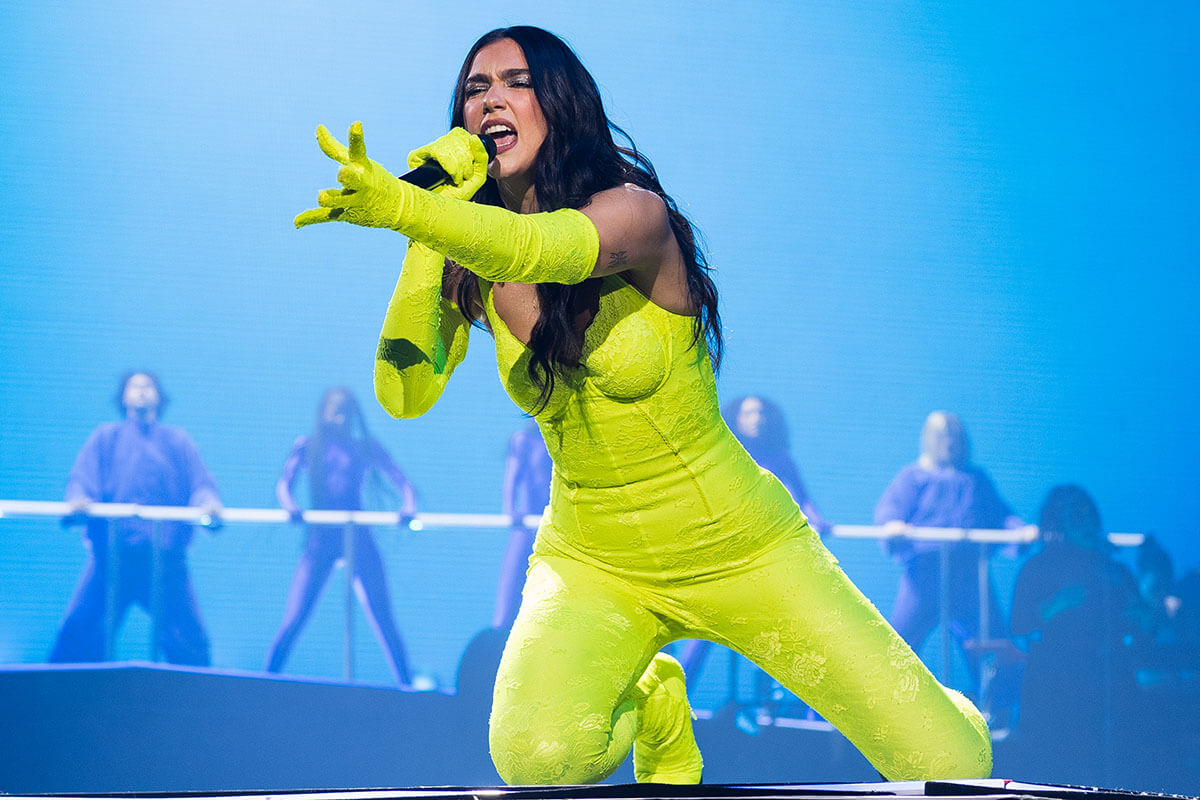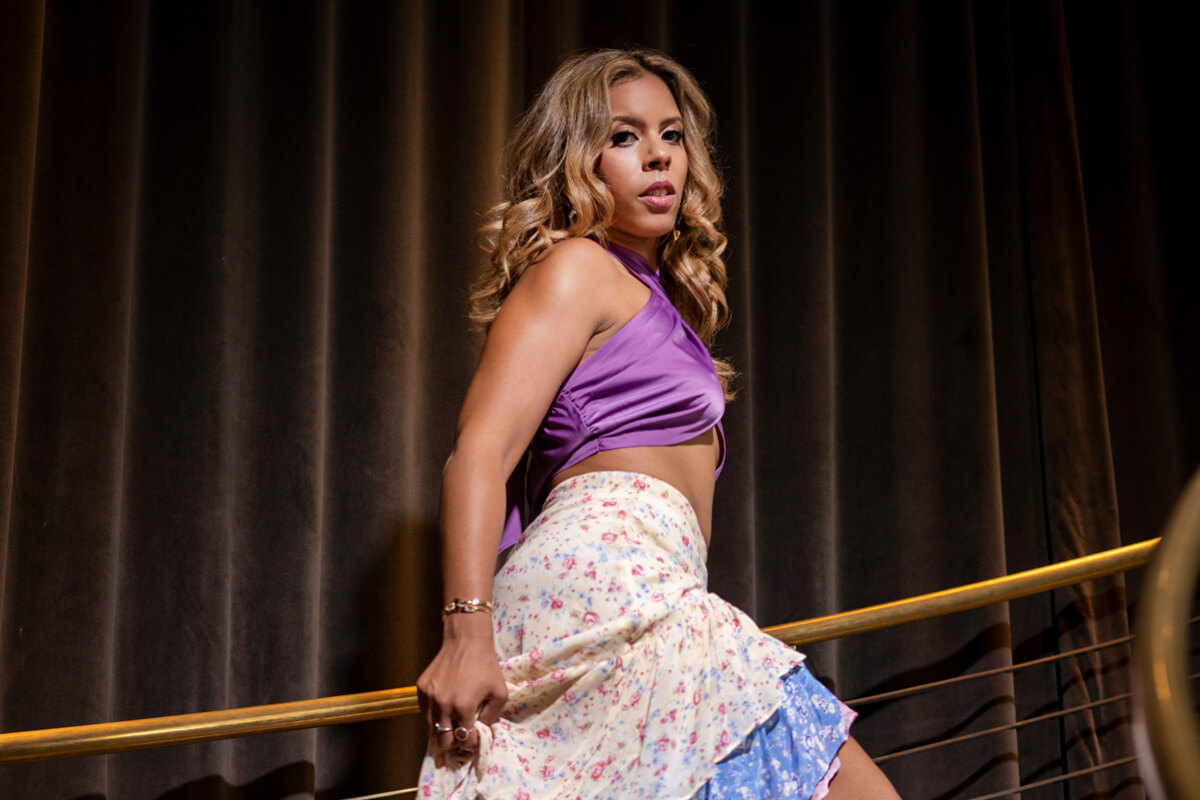Three years is a long time in social media. Back in 2019, when the MU was drawing up its latest member survey, MU Campaigns and Social Media Official Maddy Radcliff suggested polling UK musicians on a hot-tipped social video app that had originated in China in 2016. “I remember other people around me saying, ‘We’ve never heard of TikTok’. And when the statistics came back, it was quite funny, because 80% of our members were on Facebook, about 45% on Instagram, 40% on Twitter. And 0% on TikTok. Not a single soul.”
It’s safe to say a poll taken today would look very different. Since 2020, TikTok has been downloaded globally more than any other social, communication, photo, video or entertainment app. According to App Annie’s Mobile Forecast report, the platform is set to surpass 1.5 billion users over the next twelve months. Meanwhile, Instagram’s undignified scramble to include a video feature shows how seriously this platform is viewed by rivals.
 Dua Lipa has gained much traffic both intentionally and unintentionally on TikTok platform. Photo: Jason Koerner / Getty Images
Dua Lipa has gained much traffic both intentionally and unintentionally on TikTok platform. Photo: Jason Koerner / Getty Images
What makes TikTok different to existing platforms?
Firstly, its users are young (more than half are under 34). Secondly, the TikTok algorithm working behind the scenes is considered much smarter than rivals, serving ultra-personalised content to each user’s tailored For You feed, based on their in-app choices. Bottom line: your goal as a musician is to game the algorithm so that it pushes your video into the For You feeds of interested parties.
TikTok says that 70-plus previously unknown artists who blew up on the app in 2020 went on to sign major label deals.
Critically, interaction on TikTok goes far beyond likes: a video has the best chance of being a viral hit when other users pass it on. “Engagement looks different on TikTok,” says Maddy. “There’s much more dialoguing. People can comment on your video, cut it together, greenscreen it, respond to it, add to it. That’s the nature of the platform.”
Platform for newcomers and trend-setters alike
It’s true that big fish like Ed Sheeran topped TikTok’s year-end league tables in 2021. But unlike other social platforms, where follower count is everything, TikTok is more of a meritocracy: a video posted by a newcomer is theoretically as likely to be boosted by the all-powerful algorithm if it hits the right marks. “I realised TikTok was a great platform for musicians when smaller artists started having success,” says Dundee singer-songwriter Frances Gein (@francesgein). “The idea that a song can be used to create trends and millions of videos spawning from it is a unique selling point.”
Unless you’re accepted into the Creator Fund, TikTok doesn’t generate money for musicians. But according to a study by analytics experts MRC Data, 67% of app users are more likely to seek out songs on streaming platforms after hearing them on TikTok. Success on the platform can also segue into more traditional wins: TikTok says that 70-plus previously unknown artists who blew up on the app in 2020 went on to sign major label deals.
The potential of hits and misses
First off, a disclaimer. Nobody knows for sure what will catch fire on TikTok (one of the app’s biggest success stories, Bella Poarch, took off with a video in which she stared blankly into the camera and nodded robotically over a beat). Fleur McGerr is a social media manager and has seen how arbitrary the app can be. “Some very unexpected things can go viral on TikTok,” she says. “Whereas, as any social media manager knows, things you think are an absolute dead cert can sink without a trace.”
In a major-label scenario where money is no object, a musician might pay a TikTok influencer to push their song. For grassroots artists without that option, traction on TikTok takes a little more ingenuity, and the app’s most successful exponents employ tried-and-tested methods to give them the best chance of cutting through the competition.
Watch other users before jumping into it yourself
In such a vast marketplace, the first step is to spend time as an observer, familiarising yourself with the app’s format and features. Do some research and embed yourself within the communities you hope to engage and see what’s trending. “There are so many subcultures on TikTok,” says Maddy. “If you just go on the app and watch a few videos, that doesn’t mean you see the totality.”
“To really get the most out of TikTok, you do have to spend time on there learning what’s trending, what people are doing, what works and what doesn’t,” agrees McGerr. “There’s also a lot of extremely inane stuff to sift through. It’s a big time drain, like any social network – but worse.”
Posting little and often
TikTok’s algorithm is known to reward regular content posters over those who merely dip in. If you’re serious about success on the app, commit to a regular schedule and time your posts for when your intended audience will be active (you can do a deep dive into this by upgrading to a Pro Account, giving access to follower activity data). “They say that posting three times a day is optimal,” explains McGerr. “No one with a job has time for that, surely, but regular posts really work.”
The TikTok algorithm also rewards videos that are watched all the way through, again and again. Obviously, this is far more likely to happen if you can identify the most impactful section of your song and stick to a maximum video duration of 15 seconds. “The main, younger demographic on TikTok has an attention span of only eight seconds,” points out McGerr. “Slightly older people have a massive 12 seconds. But #learnontiktok videos can make use of the full three-minute limit and still do well.”
Using TikTok's toolset to your benefit
We’ll leave the specific content of your video down to you (it could literally be anything, from a dance to a lip-sync over your song). But for Gein, there’s a pattern to the videos cutting through on TikTok. “They have to be straight to the point, with constant stimulation. As well as with aesthetically pleasing imagery – hence why TikTok lights have become a popular thing. What doesn’t work? Anything trying to be a YouTube video, too much talking, no personal information for people to contact you. Just posting a song and asking people to check it out won’t get you anywhere.”
 Singer, songwriter and rapper S1mba had a No.3 UK hit single with Rover (feat.DTG), after the song went viral on TikTok. Photo: John Phillips / Stringer / Getty Images
Singer, songwriter and rapper S1mba had a No.3 UK hit single with Rover (feat.DTG), after the song went viral on TikTok. Photo: John Phillips / Stringer / Getty Images
TikTok excels at simple content creation. Once familiar with the toolset, a typical user can go from first idea to final cut in ten minutes. But while videos that feel spontaneous and authentic often do better than polished offerings, double-check before posting that you’ve included critical info such as the song details, so listeners can head to your other (paying) channels. “Unlike other platforms,” warns McGerr, “you can’t go back and edit videos on TikTok”.
You’ll be rewarded by the algorithm for using TikTok’s built-in tools, so do as much content creation within the app as possible. “Make use of the app’s filters, stickers and – when appropriate – built-in music to boost engagement,” says Adam Rigg of acclaimed UK blues-rockers The Bad Day. “Another thing that seems to work well is posting a short video with text over the video that takes longer to read than the length of the video. This means the video is watched several times and triggers the algorithm to boost the post, so more people see it.”
A two-way engagement
Engagement with fellow creators shouldn’t be an afterthought. Liking posts and interacting with those who comment on your videos tells the algorithm that you’re worth championing. “Do spend time on TikTok following other profiles for ideas and make sure you’re interacting with other people,” says McGerr. “Not just pushing posts out and leaving it.”
But the most successful TikTok users go further. While you’re obviously here to promote your own music, scratching the back of a fellow artist by creating your own version of their trending song – maybe by using the Duet and Stitch features – will both please the algorithm and pay you back with increased visibility for your own content. “It’s a win-win for everyone,” says Gein.
No content goes to waste
As with any social platform, there will be disappointments: videos that stall, listeners who don’t convert into followers, even online abuse. But even if a post doesn’t fly the first time around, don’t delete it. The TikTok algorithm doesn’t hold a grudge and the failure of older content won’t stop it boosting subsequent videos. If you score a hit later, fans can visit your page, discover what you’ve done before and send that viral, too.
 Songwriter and vocalist Kelli-Leigh says that the timing of posts on TikTok can sometimes be key. Photo: Helen Boast
Songwriter and vocalist Kelli-Leigh says that the timing of posts on TikTok can sometimes be key. Photo: Helen Boast
“I’ve posted content which has bombed, with hardly any views, deleted it and reposted it at another time, and it’s done well – so sometimes timing is key,” explains the British songwriter and vocalist, Kelli-Leigh (@kellileighuk). “And when my ‘did you know I sang’ video went viral, all the past content I had made ended up being viewed by thousands of people. Having that content there showed my personality, which helped me garner a bigger following. In short, the content is never wasted, it’s just there ready if something catches…”
Taking care of your mental health and wellbeing
TikTok offers huge benefits for musicians and can have a real sense of community despite the global scale. On the flipside, says Frances Gein, with its high stakes and all-too-visible extremes of success and failure, the app is not always a positive space.
“It’s easy to get down when using the TikTok app, as often you are seeing other people having successful videos and viral hits. It can make you feel like giving up. As well as that, I think more than other social medias it can have a bad effect on mental health, especially that of teens who have body image issues. I limit myself using TikTok to avoid these feelings, so I can imagine younger people struggling.”
In the worst-case scenario of online abuse, MU Campaigns & Social Media Official Maddy Radcliff reminds TikTok users that the MU offers specialist help. “TikTok has so much potential. But it does come with all the same downsides as the other social media platforms. So I think one thing that’s really important to mention is how to deal with online abuse. We’ve just put together some advice on online abuse.
“We’ve just put together some advice on online abuse. It signposts lots of resources – as well as the MU’s Safe Space for reporting sexual harassment and abuse.
The MU also provides a list of mental health and wellbeing sources of support, alongside resources such as The Young Freelancer’s Guide to Mental Health and the Music Industry.